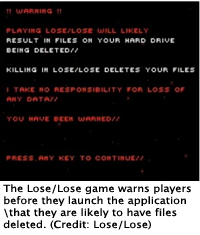Mac Game: Art project or malware?
by Elinor Mills
CNET.com
November 4, 2009
 As part of his Master of Fine Arts thesis project, Zach Gage wrote a game to run on Macintosh computers that resembles Space Invaders but with a digital roulette twist–for every alien space ship the player destroys a random file on the computer is deleted.
As part of his Master of Fine Arts thesis project, Zach Gage wrote a game to run on Macintosh computers that resembles Space Invaders but with a digital roulette twist–for every alien space ship the player destroys a random file on the computer is deleted.
“Lose/Lose is a video-game with real life consequences. Each alien in the game is created based on a random file on the player’s computer. If the player kills the alien, the file it is based on is deleted. If the player’s ship is destroyed, the application itself is deleted,” the computer technology design major wrote on his Web site.
“At what point does our virtual data become as important to us as physical possessions? If we have reached that point already, what real objects do we value less than our data?” he asks.
On September 14, Gage posted his “Lose/Lose” game on his Web site and at the Experimental Gameplay Project, which links back to his site where he has a big warning in red: “KILLING ALIENS IN LOSE/LOSE WILL DELETE FILES ON YOUR HARDDRIVE PERMANENTLY.” The application also displays a warning when it is launched.
This week, Symantec announced that it has flagged the application as malware, a Trojan it has dubbed OSX.Loosemaque. Sophos is calling it a Trojan too, OSX/LoseGame-A and Intego has named it OSX/LoserGame.
“We are concerned that somebody could take this and modify it in some way where users aren’t aware of the consequences,” Kevin Haley, director of product management at Symantec Security Response, said in an interview on Wednesday. “We want to make people aware of what’s on their machine and they can make the decision on whether to run it or not.”
Asked to comment on the stir his project was creating, Gage seemed amused.
“I’m kind of OK with it being labeled malware,” he said in a phone interview. “I would categorize it as dangerous software, but not malware because it is dangerous if you use it in a certain manner. Whereas malware implies it was designed to be malicious…Calling it a Trojan is really blowing it out of proportion.”
Trojan horses are programs, typically masquerading as a benign program or hidden in legitimate software, which provide an attacker unauthorized access to the system. However, Gage’s program explicitly says what it does and what the consequences are.
In addition to exploring the nature of risk and reward with regard to war and the notion of how small wins distract from the larger picture, the game provokes discussion about the risks people take with technology every day, Gage said.
“We need to pay attention to how we behave on computers,” he said.
Apparently, some people don’t mind playing with fire. The list of high scorers on the game site shows more than 40 players, with the highest score having destroyed nearly 5,000 files, or aliens.
“I’m surprised anyone has played it,” Gage said. “I’m shocked.”
Asked to comment on any possible beneficial merits of the project, Symantec’s Haley said: “I don’t see the positive aspect of it, but I suppose if it’s art we’re not supposed to completely understand it.”
Symantec created a video that shows how the game works:
